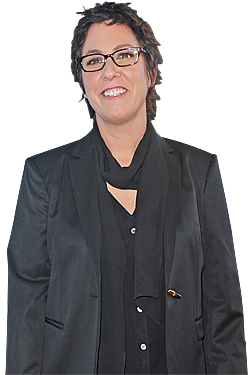
As lesbian partners unwillingly reunited with the sperm-donor father (Mark Ruffalo) of their teenage kids, Annette Bening and Julianne Moore are ludicrously funny in The Kids Are All Right, which opens this Friday. And it’s all thanks to a script by Scott Blumberg and director Lisa Cholodenko, who amplifies the wry humor (evident, but more subdued in her more dramatic features High Art and Laurel Canyon). We spoke with Cholodenko about making a comedy about gay marriage set in California, under the shadow of Prop 8.
What sparked the idea?
I was about to try to start getting pregnant and I was in the position that the women in the film are in — which is I was with my partner thinking: How are we going to do this? Are we going to do it with a friend? Get a sperm donor? We were starting to go through the inventory of feelings we had about that and started looking into finding a sperm donor. It just sort of sparked this meditation: What would happen eighteen years later? What would that look like? Then I ran into Stuart Blumberg about five years ago, who’s an old friend from New York. I said maybe it would be something that would be interesting for us to put our styles together, because his style is much more commercial and I thought that this story would benefit from not only having a male perspective, but out of a more commercial edge.
It is much more aggressively funny than your other films.
I think there is comedy in my other movies, but it just got buried in something tonal. I wasn’t sure what it was and wasn’t sure how to get out of that, but I wanted to work with Stuart, who’s very funny. I thought his orientation and sense of pacing and stuff really helped pull my instincts to the surface.
Bening and Moore are so good together. How did you cast them?
It started out with Julianne Moore, who’d been attached to it for probably four years. It was a process of me making endless lists and mixing and matching. Like, who’s a great actor and who’s funny and who’s still sexy but older? It was difficult. Then I was in Pete’s coffee or something and my sister-in-law saw Annette. She said, “Oh, do you know Lisa Cholodenko?” Then she said, “Lisa’s writing this great movie and you should read it, you would be perfect for it.” I was a little bit like: “Whoa, wait a minute. You’re casting my movie!” But as I sat with it I thought, You know what, she’d be perfect. I ended up really tailoring the script to her.
A lot of people are going to be surprised by Julianne Moore.
On the Julianne tip, I trusted her commitment and passion for the project, but I didn’t really know how she’d respond to it once we got on the set. You know: how she was going to be with Annette Bening; and how she was going to be in this realistic gay relationship; and how she was going to be in these sex scenes with Mark that were supposed to be kind of funny and slightly kind of heightened. Just her total availability and team spirit and readiness to jump in was just stunning to me. There was just no bullshit.
Did anything about Bening surprise you?
I never expected the kind of, you know, ad-lib nuance and playfulness. I knew she was serious about the part, but I didn’t know when she got on the set if she was going to be comfortable being physical with Julianne and how vulnerable was she going to let herself be. When she was as vulnerable as she was, it was just stunning to me.
It’s unusual to have two women romantic leads. Who will get the Best Actress nom?
How about both? For both, it’s some of their most complicated and real work — realism mixed with the comedy — and I feel like their spirits really come through.
As a straight guy, it really felt like a relatable story about anyone’s marriage.
That was the intention — just to get into the subtext and architecture of marriage and family and how it all works and what happens when some bomb gets thrown on it: How do you recover or not recover? You never really know until you’re tested, right?
Does it feel more urgent to get this out there now?
We’ve been developing it for five years. There was a point at the end of 2005, where I just thought: Oh, somebody’s going to just take this idea and run with it before we do. So I couldn’t be more thrilled that I got to the finish line first.
It’s not political in any overt way, but does seem important that it’s a pretty positive portrayal of a gay marriage in the middle of Prop 8.
The whole way through I felt like it’s a new era. It’s not like the eighties or nineties; it’s not a gay film festival film about politics. It’s just a family is a family is a family, you know. I wasn’t interested in doing anything that was political; it’s not where I come from. I’m just more into the human aspect of things. I was more interested in how unusual the circumstance was and the kind of new frontier for kids out there. We’re going to see more and more donor kids out there, from sperm donors and egg donors, and that’s what was interesting. What is the psychology around this? And let’s have some fun weird romp with this new frontier.

